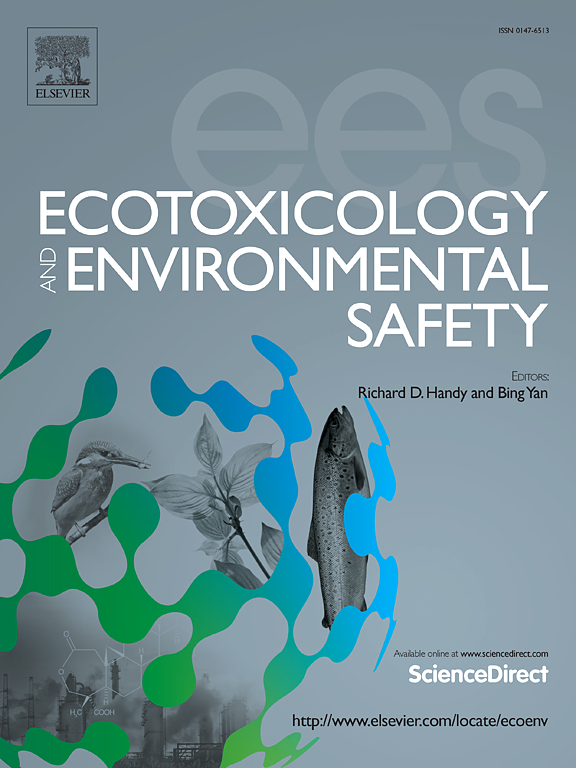柴油废气诱导肠道菌群失调和降低粪便醋酸盐:醋酸盐补充的作用
IF 6.1
2区 环境科学与生态学
Q1 ENVIRONMENTAL SCIENCES
引用次数: 0
摘要
接触空气污染会增加心血管疾病发病率和死亡率的风险。流行病学研究提供了强有力的证据,表明暴露于空气动力学直径为 2.5 µm (PM2.5)的环境颗粒物与心血管和代谢疾病的发生之间存在联系。我们已经表明,吸入的超细颗粒(UFP)或全柴油废气(DE),富集UFP,诱导心脏代谢作用,包括血脂异常和肝脏脂肪变性。然而,致病机制尚不清楚。我们最近证明,在各种动物模型中,暴露于超细颗粒范围内的环境颗粒会改变肠道微生物群组成,并有可能诱发全身效应。因此,我们假设亚慢性吸入暴露于DE会导致肠道生态失调和肠道衍生代谢物的改变,这可能是一些代谢影响的原因。雄性载脂蛋白E-/- (ApoE-/-)小鼠,暴露于吸入DE与过滤空气(FA)(6 h/天,每周5天,持续16周),盲肠微生物群组成发生变化,这与血浆胆固醇和甘油三酯升高以及肝脏甘油三酯和氧化脂质升高有关。DE暴露上调肝脏12-脂氧合酶(Alox12) mRNA和蛋白水平,同时显著降低粪便乙酸水平,与脂质和盲肠微生物群组成的变化相关。在DE颗粒处理的HepG2细胞中,代谢效应重现,包括Alox12 mRNA水平升高和分离线粒体呼吸作用降低。补充肠源性短链脂肪酸醋酸在细胞中逆转了这些作用。综上所述,吸入DE诱导肠道微生物群失调、脂质过氧化和甘油三酯积累,可能是通过线粒体功能障碍引起的,这种功能障碍在细胞中通过补充醋酸酯得到了恢复。本文章由计算机程序翻译,如有差异,请以英文原文为准。
Diesel exhaust induces gut microbiome dysbiosis and reduced fecal acetate: Role of acetate supplementation
Air pollution exposure enhances the risk of cardiovascular morbidity and mortality. Epidemiological studies provide strong evidence of a link between exposure to ambient particulate matter with aerodynamic diameter< 2.5 µm (PM2.5) and development of cardiovascular and metabolic disorders. We have shown that inhaled ultrafine particles (UFP) or whole diesel exhaust (DE), enriched in UFP, induce cardiometabolic effects, including dyslipidemia and hepatic steatosis. However, the pathogenic mechanisms remain unknown. We recently demonstrated that exposure to ambient particulate in the ultrafine-size range altered the gut microbiota composition in various animal models, with a potential to induce systemic effects. Thus, we hypothesized that sub-chronic inhalation exposure to DE leads to gut dysbiosis and altered gut-derived metabolites, likely responsible for some of the metabolic effects. Male apolipoprotein E-/- (ApoE-/-) mice, exposed to inhaled DE vs. filtered air (FA) (6 h/day, 5 days/week for 16 weeks) displayed alterations in cecal microbiota composition, which associated with elevated plasma cholesterol and triglycerides, as well as hepatic triglycerides and oxidized lipids. DE exposure upregulated hepatic mRNA and protein levels of 12-lipoxygenase (Alox12), together with significantly reduced fecal acetate levels, correlating with changes in lipids and cecal microbiota composition. Metabolic effects were recapitulated in HepG2 cells treated with DE particles, including elevated Alox12 mRNA levels and decreased respiration in isolated mitochondria. Supplementation with gut-derived short chain fatty acid acetate reversed these effects in cells. In conclusion, inhaled DE induced gut microbiome dysbiosis, lipid peroxidation and triglyceride accumulation, likely via mitochondrial dysfunction, which was rescued in cells by acetate supplementation.
求助全文
通过发布文献求助,成功后即可免费获取论文全文。
去求助
来源期刊
CiteScore
12.10
自引率
5.90%
发文量
1234
审稿时长
88 days
期刊介绍:
Ecotoxicology and Environmental Safety is a multi-disciplinary journal that focuses on understanding the exposure and effects of environmental contamination on organisms including human health. The scope of the journal covers three main themes. The topics within these themes, indicated below, include (but are not limited to) the following: Ecotoxicology、Environmental Chemistry、Environmental Safety etc.

 求助内容:
求助内容: 应助结果提醒方式:
应助结果提醒方式:


